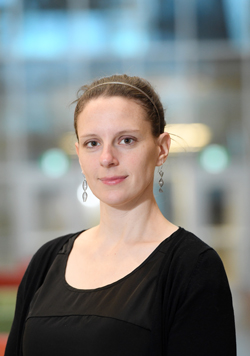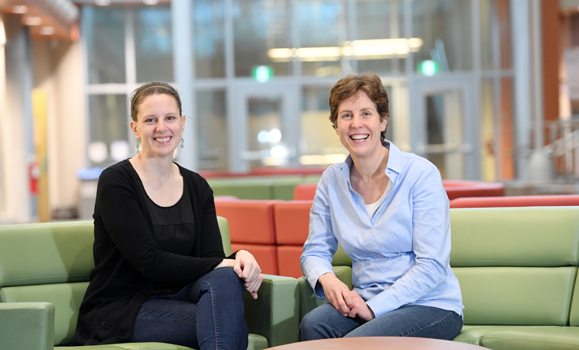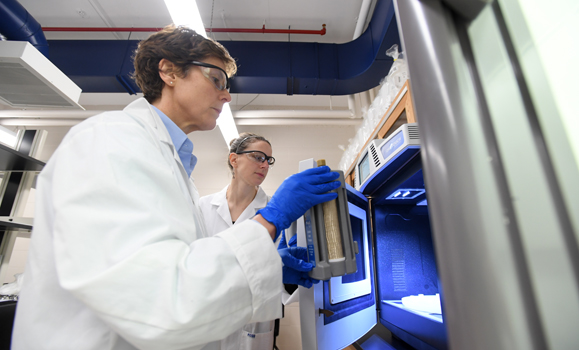Research from ∫⁄¡œ≥‘πœÕ¯Postdoctoral Fellow Erin Black provides insight into how carbon dioxide is affecting our world ‚Äî not in the sky, but in the sea. ¬Ý
 “The ocean absorbs a significant amount of human-emitted carbon dioxide (CO2 ),” says Dr. Black. “Small critters in the ocean’s surface take in CO2, just like we humans breathe in oxygen. This CO2 becomes part of their bodies in the form of organic carbon. I’m trying to uncover where this carbon goes and how it is recycled.”
“The ocean absorbs a significant amount of human-emitted carbon dioxide (CO2 ),” says Dr. Black. “Small critters in the ocean’s surface take in CO2, just like we humans breathe in oxygen. This CO2 becomes part of their bodies in the form of organic carbon. I’m trying to uncover where this carbon goes and how it is recycled.”
The International Postdoctoral Fellowship program — a new initiative of the (OFI) — provides Dr. Black the opportunity to better understand how the ocean moderates our global climate.
Like ticking clocks
Dr. Black monitors organic carbon by tracking radioactive elements that occur widely in nature. She can determine how fast organic carbon travels from one part of the ocean to another because some of these elements like to stick to organic carbon and they also release pulses of energy, just like a ticking clock, when they decay. Measuring how fast these clocks tick tells Dr. Black how conditions in a given area of the ocean are changing over time. “If we see ten counts of something over here and two counts over here, what does that mean? It tells us about a process.”
One of the big questions is carbon sequestration – how much CO2 is taken up by surface critters and how much of this carbon descends (when they perish) to the deep ocean, where it can remain for hundreds of years or more?
To support this work, OFI‚Äôs postdoctoral program has paired Dr. Black with associate professor Stephanie Kienast of ∫⁄¡œ≥‘πœÕ¯, and research professor Bob Anderson, Lamont-Doherty Earth Observatory (LEDO). Dr. Black sees huge value in the collaboration.
“You have three people that have specialties all working within the same vicinity so we can learn from each other.”

Drs. Black and Kienast in Dal's Steele Ocean Sciences Building.
Through the program, Dr. Black works on-site with both advisors and their institutions’ research communities. Currently at Dalhousie, she will transfer next fall to the Lamont-Doherty Earth Observatory (LDEO) at Columbia University for her second and final year.
Dr. Kienast chose to mentor Dr. Black, “because we get excited about the same questions, in particular, the sinking of carbon from the upper ocean to the deep ocean and the sediments. With this process, the ocean is taking up CO2.”
“Erin brings specialized know-how that is uniquely suited to quantify this process. It is a great privilege to have her here at Dal.”
A collaborative effort
Dr. Black is involved in two projects:
- Examining if, and how, the marine carbon cycle in the Arctic is being altered with global climate change; and,
- What drives the abundance of metals in the ocean, such as iron, which are vital to marine life.
The OFI’s is designed to provide future ocean leaders with international experience and build human capacity through mentorship. On working with her advisors, Dr. Black says, “they’re helping me prepare for a career, to fill out the areas that I need to continue to the next step.”
Dr. Black is one of 12 early career researchers participating in OFI‚Äôs International Postdoctoral Fellowship Program, which includes partnerships between ∫⁄¡œ≥‘πœÕ¯and institutions in France, Germany, Ireland, and the United States.

Drs. Black and Kienast at work in the lab.
‚ÄúThe OFI program brings bright minds to ∫⁄¡œ≥‘πœÕ¯after their PhDs,‚Äù says Dr. Kienast. ‚ÄúThis is at a pivotal time in a researcher‚Äôs career during which they innovate and contribute immensely to the scientific endeavor.‚Äù
OFI is now accepting applications for the International Postdoctoral Program. .

